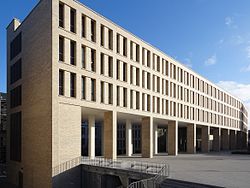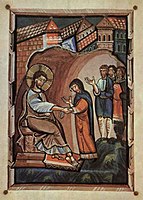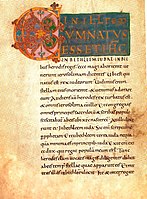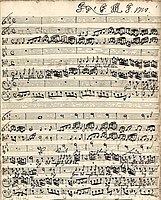University and State Library Darmstadt
| University and State Library Darmstadt | |
|---|---|
| Universitäts- und Landesbibliothek Darmstadt | |
 ULB Darmstadt in 2015 | |
 | |
| 49°52′36″N 8°39′27″E / 49.87653°N 8.65763°E | |
| Location | Magdalenenstraße 8, 64289 Darmstadt, Germany |
| Established | 1567, 2000 integration TU Darmstadt |
| Branches | 2 |
| Collection | |
| Size | 4.7 million publications (2021) |
| Legal deposit | Yes, southern Hesse area and the Giessen region.[1][2] |
| Other information | |
| Director | Thomas Stäcker |
| Employees | 103.66 FTE (2021) |
| Public transit access | Tram, bus: Schloss |
| Website | www |
The University and State Library Darmstadt (German: Universitäts- und Landesbibliothek Darmstadt (ULB)) supplies literature and information for members of the Technische Universität Darmstadt and the population of Darmstadt and southern Hesse.[3] Purposes of the institution include education, research and teaching.[3] As of 2021[update], the library has a stock of 4,756,277 publications with an annual circulation of 354,200; ULB has 220,000 visitors and employs a staff of 103.66 FTE.[4][5] The ULB offers at three locations learning rooms and spaces for over 1000 people.[6] As of 2023[update], the City Centre library opened 24 hours per day.[7][8] Director is Thomas Stäcker.[9] ULB Darmstadt is member of the Hessisches BibliotheksInformationssystem (hebis) (Hessian library information system).[10]
History
[edit]Basis of the library was the book collection of George I, Landgrave of Hesse-Darmstadt in 1567, the year the landgrave moved to Darmstadt.[11][12] In 1595, the collection comprised c. 750 works.[13] The Darmstädter Hofbibliothek had been located in the Residential Palace Darmstadt (Schloss).[11] Louis VI, Landgrave of Hesse-Darmstadt acquired the library of the Hanau Privy Councilor Johann Michael Moscherosch (1601–1669) with c. 2300 books, which was placed in the Glockenbau (bell building), part of the Schloss.[13] The first librarian Johann Balthasar Moscherosch took office in 1692.[13] Louis I, Grand Duke of Hesse (1753–1830), with his passion for collecting, promoted the library (1789: 16,000 volumes).[13][14] During secularization in 1803, libraries of the Benedictines in Seligenstadt, the Dominicans in Wimpfen, the Capuchins in Bensheim and Dieburg and the Carmelites in Hirschhorn were brought to Darmstadt.[13] Substantial was the 1805 addition of the Cologne Baron von Hüpsch (1750–1805) collection.[13] In 1834, under Louis II, Grand Duke of Hesse, the library moved to the new Baroque part (De-la-Fosse-Bau) of the Schloss.[15] It was the ninth largest library of the German empire in 1902, grown to 564,000 volumes in 1914 and named Hessische Landesbibliothek in 1920.[13] In the Brandnacht (fire night) on 11 to 12 September 1944 the library in the Schloss was partly destroyed and the majority of the books were burned.[11] In 1948, the institution was merged with the former Technische Hochschule library to the Hessische Hochschul- und Landesbibliothek.[14]
After integration into the Technische Universität Darmstadt in 2000, it received its new name in 2004.[14] In 2012, ULB Darmstadt moved to a new building.[16]
Collections
[edit]- Baron von Hüpsch Collection[17]
- Keyserling estate[18]
- Hitda Codex[19]
- Prayer book of Stephan Lochner[20]
- Gero Codex (UNESCO's Memory of the World Programme)[21]
- Golden Bull of 1356, Cologne edition (UNESCO's Memory of the World Programme)[22]
- Manuscripts by Christoph Graupner[23]
Gallery
[edit]-
Healing Peter's Mother-in-law, from an 11th-century manuscript from the Abbes Hitda von Meschede
-
Text of Gero Codex
-
The first page of the score of Christoph Graupner's cantata Herr du machst dein Werk lebendig (GWV 1113/18)
Main building
[edit]The building was opened on 12 November 2012 and was built by the architecture firm Bär, Stadelmann, Stöcker Architekten BDA.[16][11]
Branches
[edit]Sources:[24]
- Lichtwiese, Franziska-Braun-Straße 10, 64287 Darmstadt (ISIL DE-17-2) (opened 27 May 2013)[25]
- Residential Palace Darmstadt (Schloss), Residenzschloss 1, 64289 Darmstadt (focus on humanities)[11]
See also
[edit]References
[edit]- ^ "Deposit Copies". Universitäts- und Landesbibliothek – TU Darmstadt. Archived from the original on 21 February 2023. Retrieved 21 February 2023.
- ^ "Bürgerservice Hessenrecht". Bürgerservice Hessenrecht (in German). Archived from the original on 21 February 2023. Retrieved 21 February 2023.
- ^ a b "Über uns". Universitäts- und Landesbibliothek – TU Darmstadt. Archived from the original on 5 February 2023. Retrieved 5 February 2023.
- ^ "Jahresberichte". Universitäts- und Landesbibliothek – TU Darmstadt (in German). Archived from the original on 5 February 2023. Retrieved 5 February 2023.
- ^ Universitäts- Und Landesbibliothek Darmstadt (2022). "Jahresbericht". Universitäts- und Landesbibliothek Darmstadt. doi:10.26083/TUPRINTS-00021197. Archived from the original on 11 December 2023. Retrieved 5 February 2023.
- ^ "Library Profile". Universitäts- und Landesbibliothek – TU Darmstadt. Archived from the original on 5 February 2023. Retrieved 5 February 2023.
- ^ "Opening Hours". Universitäts- und Landesbibliothek – TU Darmstadt. 24 December 2022. Archived from the original on 5 February 2023. Retrieved 5 February 2023.
- ^ "Bald Entscheidung über 24-Stunden-Öffnung der Unibibliothek Darmstadt". Focus (in German). 9 February 2014. Archived from the original on 20 February 2023. Retrieved 20 February 2023.
- ^ "Library Management". Universitäts- und Landesbibliothek – TU Darmstadt. Archived from the original on 5 February 2023. Retrieved 5 February 2023.
- ^ "Universitäts- und Landesbibliothek – Stadtmitte". hebis (in German). Archived from the original on 7 February 2023. Retrieved 7 February 2023.
- ^ a b c d e "Universitäts- und Landesbibliothek Darmstadt (ULB)". Darmstadt Stadtlexikon (in German). Archived from the original on 5 February 2023. Retrieved 5 February 2023.
- ^ "Hessische Biografie : Erweiterte Suche : LAGIS Hessen". Landesgeschichtliches Informationssystem Hessen (LAGIS) (in German). Archived from the original on 27 February 2023. Retrieved 27 February 2023.
- ^ a b c d e f g "Handbuch der historischen Buchbestände in Deutschland, Österreich und Europa (Fabian-Handbuch): Hessische Landes- Und Hochschulbibliothek (Darmstadt)". Handbuch der historischen Buchbestände in Deutschland, Österreich und Europa (Fabian-Handbuch) (in German). Archived from the original on 16 April 2022. Retrieved 19 February 2023.
- ^ a b c "Geschichte". Universitäts- und Landesbibliothek – TU Darmstadt (in German). Archived from the original on 19 February 2023. Retrieved 19 February 2023.
- ^ "Das Darmstädter Residenzschloss – eine Chronik". TU Darmstadt (in German). 8 April 2013. Archived from the original on 21 March 2023. Retrieved 19 February 2023.
- ^ a b Hein, Rainer (31 January 2011). "TU Darmstadt: 78 Kilometer Regalböden". FAZ.NET (in German). Archived from the original on 5 February 2023. Retrieved 5 February 2023.
- ^ "Hüpsch Collection". Universitäts- und Landesbibliothek – TU Darmstadt. Archived from the original on 9 February 2023. Retrieved 9 February 2023.
- ^ "Keyserling, Hermann Graf: Nachlass". Universitäts- und Landesbibliothek – TU Darmstadt (in German). Archived from the original on 10 February 2023. Retrieved 10 February 2023.
- ^ "Hitda-Codex". Darmstadt Stadtlexikon (in German). Archived from the original on 7 February 2023. Retrieved 9 February 2023.
- ^ "Lochner-Gebetbuch". Darmstadt Stadtlexikon (in German). Archived from the original on 9 February 2023. Retrieved 9 February 2023.
- ^ "Gero-Codex". Darmstadt Stadtlexikon (in German). Archived from the original on 9 February 2023. Retrieved 9 February 2023.
- ^ Holy Roman Empire; Staub, Kurt Hans; Fechner, Jörg-Ulrich; Holy Roman Empire. Emperor; Holy Roman Empire. Reichshofkanzlei; Hessische Landes- und Hochschulbibliothek Darmstadt (1982). Die Goldene Bulle Kaiser Karls IV. von 1356 : Faksimile der Ausfertigung für den Kurfürsten von Köln (in German). [Darmstadt]: TH Darmstadt. ISBN 3-88607-026-3. OCLC 14215417.
- ^ "Music Collection". Universitäts- und Landesbibliothek – TU Darmstadt. Archived from the original on 9 February 2023. Retrieved 9 February 2023.
- ^ a b "Locations". Universitäts- und Landesbibliothek – TU Darmstadt. Archived from the original on 5 February 2023. Retrieved 5 February 2023.
- ^ Svenshon, Helge (2013). "Das neue Hörsaal- und Medienzentrum der Technischen Universität Darmstadt auf dem Campus Lichtwiese" (PDF). Abitech. 33 (3). Walter de Gruyter GmbH: 122–132. doi:10.1515/abitech-2013-0020. ISSN 2191-4664. S2CID 110060984. Archived (PDF) from the original on 5 April 2023. Retrieved 19 February 2023.
Further reading
[edit]- Gebert, Björn; Göller, Andreas; Hahn, Thomas; Svenshon, Helge; Uhlemann, Silvia; Universitäts- und Landesbibliothek Darmstadt (2017). 450 Jahre Wissen – Sammeln – Vermitteln von der Hof- zur Universitäts- und Landesbibliothek Darmstadt : 1567 – 2017 (PDF) (in German). Darmstadt: Justus von Liebig Verlag. ISBN 978-3-87390-402-6. OCLC 1012103953.
- Svenshon, Helge; Universitäts- und Landesbibliothek Darmstadt (2014). Neue Mitte(n) die Bibliotheksneubauten der Technischen Universität Darmstadt (in German). Darmstadt: Justus von Liebig Verlag. ISBN 978-3-87390-351-7. OCLC 892746174.
- Corsten, Severin (1991). Handbuch der historischen Buchbestände in Deutschland: Hessen, A-L (in German). Vol. 5. Hildesheim: Georg Olms Verlag. ISBN 978-3-487-09579-0.
External links
[edit]- Official website
 (in German and English)
(in German and English)



